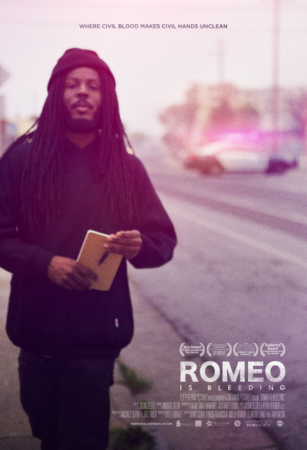
“Violence is beyond flesh, it’s spiritual.”- Donté Clark
Most people are first introduced to Shakespeare in high school. As teenagers, we sat hunched over our desks trying to make sense of 16th century prose. More often than not, it felt like a bunch of archaic language mixed in with some incomprehensible jargon, until we were finally able to grasp the stories and the nature of the words.
Jason Zeldes’ “Romeo Is Bleeding” is the story of Donté Clark, a young educator, activist, poet and resident of Richmond, California. After rereading Shakespeare’s “Romeo + Juliet”, Clark realizes that the same strife that happens in the classic story, is also happening outside of his window.
Richmond, California is bleeding, hemorrhaging actually. North and Central Richmond have been at war for years, and people are being slaughtered in the streets on a daily basis. Donté Clark stands in the midst of this, desperate for change. Growing up in North Richmond with seven brothers and sisters, Clark’s goal was to become the biggest drug dealer in the Bay Area. But, his goals shifted when his teacher, Molly Raynor, introduced him to Richmond’s “Making Waves” college preparatory program, where he discovered his most powerful weapon, his voice.
The documentary follows Clark as he rewrites Shakespeare’s tragedy into his own adaption, one that he hopes will bring together the youth of Central and North Richmond. Clark also enlists his students from his program RAW Talent (Richmond Artists With Talent), where he serves as artistic director, to help him write and put on the play, which he names, “Té’s Harmony”.
For the first quarter of the film, there were a ton of aerial shots of Richmond, along with flashy stylistic choices that really weren’t needed. As the audience tries to get to know Clark and the world that he lives in, these over the top film techniques constantly jerked us out of the story. Luckily, as the film pressed forward, this calmed down considerably, letting the audience focus on Clark (who is extremely compelling) and the others involved in the RAW talent program.
For six months, RAW prepares “Té’s Harmony,” for the stage. Clark writes the dialogue, while his students write the monologues for their individual characters. They all come together numerous times for workshop sessions. During these workshops, we come to know more about Molly (Clark’s mentor) Deandre Evans, his protégé, and D’Neise Robinson who plays Harmony opposite Clark in the play. Evans especially seems adamant about running from a fate that so many of his friends have fallen to.
There are certainly lighthearted moments in the film, however the reality is that Clark’s world is quite bleak. There is a great deal of pain, hurt, and massive amounts of death. Clark describes his experiences as “like being raised in a cemetery.” It’s not just the men who feel these sentiments; the young women of Richmond feel it too. D’Neise, who is accustomed to strapping on her shields daily, in order to keep the pain at bay, struggles to find vulnerability on stage.
Though the city is seen from Clark’s eyes, Zeldes is careful to give a well-rounded view of Richmond and its issues. The audience hears from members of the community, law enforcement, and gains knowledge from historical facts. Still, it’s unclear where the rift in Richmond really started, therefore there are no real answers to the questions that Richmond residents, and the film audience seeks. There is only Donté Clark’s pen, voice, and his desperate desire to do something to begin healing not only the residents of Richmond, but himself.
“Romeo Is Bleeding” was not at all what I expected. Though moving and compelling, there are just as many moments in the film that will gut you. Death is a constant as if it plays its own character in the film. No community of people, and certainly sole person should have to go on like this; existing in the middle of such crushing despair. Still, the film forces its audience to continue to face the realities that far too many of people are dealing with on a daily basis. It’s a film about laws, loss and heartbreak, but also one of optimistic inspiration and new beginnings. Richmond, California is bleeding, but if you look around so is everyone else.
“Romeo Is Bleeding” screens today, Friday, May 20th, at 7:30 pm, at the Museum of the Moving Image at 36-01 35 Ave, Astoria, NY. Donté Clark will be present in person for the screening. Click here for tickets.
Aramide A Tinubu has her Master’s in Film Studies from Columbia University. She wrote her thesis on Black Girlhood and Parental Loss in Contemporary Black American Cinema. She’s a cinephile, bookworm, blogger, and NYU + Columbia University alum. You can read her blog at: www.chocolategirlinthecity.com or tweet her @midnightrami
